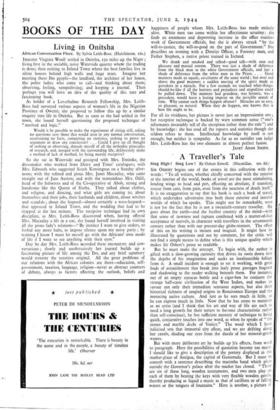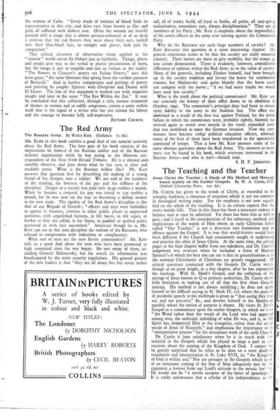A Traveller's Tale
Sing High I Sing Low I By Osbert Sitwell. (Macmillan. Kos. 6d.) SIR OSBERT begins one of the essays in this collection with the words: " To all writers, whether chiefly concerned with the exterior or the interior or the world, books of travel are the most stimulating, lending wings to head and pen, effecting an absolute, if transient, rescue from care, from pain, even from the nearness of death itself." It is rio exaggeration to say that his book is such a book of travel, which undertakes adventures into both those exterior and interior worlds of which ho. speaks. This might not be remarkable, were it not for the fact. that he is not a twentieth-century traveller. He goes about the earth—and the further country of the mind—with that sense of newness and rapture combined with a matter-of-fact acceptance of marvels, in character with travellers in the seventeenth century rather than with our present-day globe-trotters. The effect of this on his writing is instant and magical. It might be.st be illustrated by quotations and not by comment, for the critic will not find a simple means to define what is this unique quality which makes Sir Osbert's prose so readable. . But he must make the attempt. To begin with, the author is gifted with a slow-growing curiosity that drives its roots down into the depths of his imagination and sucks an inexhaustible foliage from it. A small incident is enough to set it working, with great buds of astonishment that break into leafy prose passages fragrant and shadowing to the reader walking beneath them. For instance, out of an empty curacao bottle and a cigar-box he conjures the strange half-caste civilisation of- the West Indies, and makes us savour not only their immediate sensuous aspects, but also their historical richness of tangled origins in Renaissance Europe and the menacing native culture. And just as he sees much in little, so he can express much in little. Now that he has come to maturity as an artist (and I think that his art and way of life are such as need a long growth for their nature to become characteristic rather than self-conscious), he has sufficient mastery of technique to bring quick, conjurative touches into one word, as when he speaks of " the stones and marble decks of Venice." The word which I have italicised sets that immortal city afloat, and we are drifting along her canals, shading our eyes from the dazzle of her mineral-green waters.
But with more deliberate art he builds up his effects, from word to paragraph. Here the possibilities of quotation become too manY. I should like to give a description of the pottery displayed in the market-place of Antigua, the capital of Guatemala. But I must be conterit with a sentence describing the marimba band which plays outside the Governor's palace after the market has closed. There are six of these long, wooden instruments, and two men play on each of them by beating the keys with very flexible wooden gavels, thereby producing as liquid a music as that of carillons or of falling waters or the tongues of fountains." Here is another, a picture of
the women of Cuba. " Every shade of mixture of blood finds its representative in this city, and skins vary from brown to lilac and gold, all suffused with darkest rose. Often the women are heavily painted with a -rouge that is almost petunia-coloured or of so deep a crimson that the red flowers they wear above their ears, tucked into their blue-black hair, so straight and glossy, look pale by comparison." This critical clearness of observation when applied to his " interior " world serves Sir Osbert just as faithfully. Things, places and people give way to the verbal or plastic presentation of them, but the image is just as tangible and just as various as the reality. " The flowers in Chaucer's poetry are Italian flowers," says this keen gazer, " the same blossoms that spring from the verdant pastures of Botticelli." And in further comparisons and pairings of poetry and painting he couples Spenser with Giorgione and Donne with El Greco. The line of this argument is worked out with exquisite insight and taste in the essay " The Eye Within the Ear." It may be concluded that this collection, through a rich, mature treatment of themes so various and so oddly congruous, creates a unity within itself that is the signal of a writer who has not stinted the labour
Alf and the courage to become fully self-expressive.
RICHARD CHURCH.



























 Previous page
Previous page